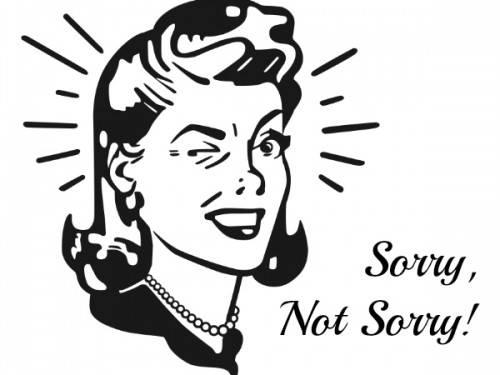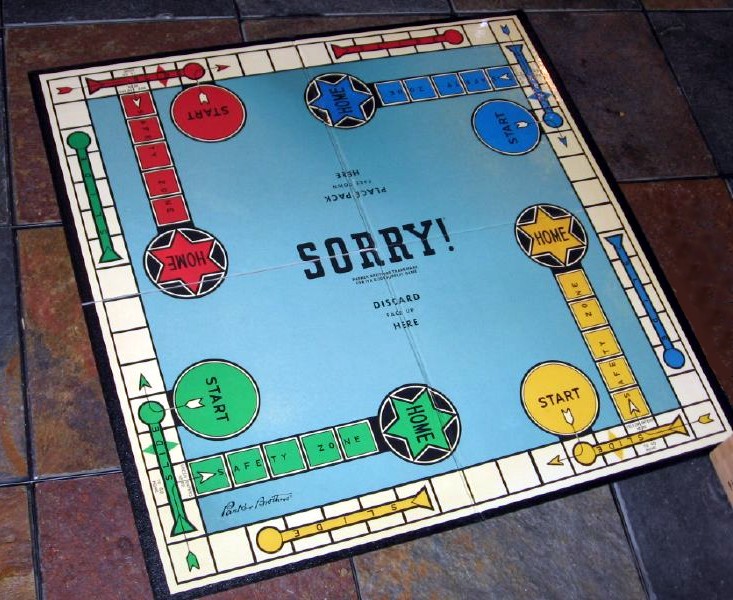
Elton, I’m sorry to say you were wrong – sorry isn’t the hardest word, not for me anyway. And probably not for a lot of people suffering from mental health issues. I constantly feel the need to apologise for an illness I didn’t ask for, and an illness, no less, which makes me apologise for everything in general, even when there is nothing to apologise for.
I’m sure people with other disabilities also feel the need to apologise for their condition, as we British hate to inconvenience others. I know that my Nana, having recently succumbed to the use of a wheelchair as she is no longer strong enough to walk very far, hates the fact she may be a trouble to others. Not only do people fear being a burden to others, they also fear losing their independence. At my lowest point I had exactly this fear, how could I not go out alone anymore? Why did I need someone to accompany me everywhere? I’m sorry to my family and friends that had to deal with me when I was like that, but, more importantly, I was sorry for myself – I had let myself down.
When reading about anxiety I have come across a few anxiety sufferers who have stated that they would rather be in a wheelchair than have panic disorder. Although this will sound shocking to people who have never endured panic disorder, agoraphobia and general anxiety disorder, I understood completely how these people were feeling and secretly felt the same. A person in a wheelchair is never told to pull themselves together and just go for a walk down to the shops, but a person with anxiety-induced agoraphobia may hear this very often.
Mental health issues are not visible disabilities, we have no obvious marker that makes it easier for us to ask for help or arrangements to be made on our behalf. We have to go to the trouble of explaining our needs, often difficult in a society that still attaches stigma to mental illness. People with visible disabilities may apologise for inconveniencing people, but they often feel justified in doing so as their physical disability cannot be helped, and apologising isn’t a ‘symptom’ of their illness like it is of anxiety. Anxiety sufferers often feel ashamed of the fact they need help and feel immense guilt for troubling people.
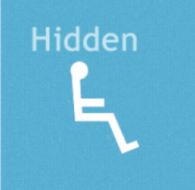
The guilt trip
Anxiety can make you feel guilty for just existing. There are quite a lot of blogs by anxiety sufferers who say they feel the need to apologise just for being themselves, something we should never have to do, but can often feel we need to. Sometimes I feel sorry for the people closest to me and all that they have to put up with when they’re with me. I’m sorry my Mum feels the need to pussy foot around me in her own house because my anxiety makes loud noises almost unbearable. I’m sorry she asks my ‘permission’ to eat an apple whilst I’m sat with her in her living room as my Misophonia makes me explode unreasonably at one of the people who has loved and cared for me unconditionally. I’m sorry my friends have to always let me take the aisle seats in cinemas/theatres so I have an easy exit if I need one. I’m sorry they have to regularly see me in tears when they’re having problems of their own. I’m sorry my boyfriend had to leave a party at his friend’s house with me earlier than he might have wanted as I’d broken down in tears after feeling like I didn’t fit in because I wasn’t drinking (a preventative measure as I didn’t want to wake up with a hangover that set off panic attacks). I’m sorry that my boyfriend will have to come with me to the doctors when we decide to start trying for children to weigh up the pros and cons of me staying on my medication and risk harming our child or come off it and risk spiraling back into depression, panic disorder and agoraphobia. As you can see, my guilt ranges from the almost insignificant (does it really matter if my friends have to sit further in the aisle than me at the cinema) to intense feelings of shame that my illness will probably make what should be one of the most happy times of your life (creating a child together) extremely difficult.
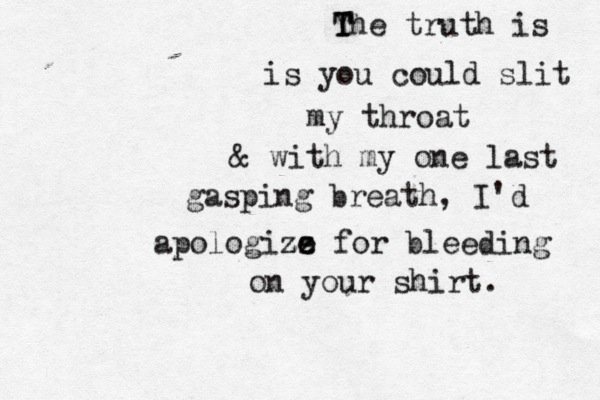
Seeking Assurance
I may laugh with friends and work colleagues about my tendency to apologise for everything but this constant need to take the blame is actually a habit that is damaging my self-esteem. It’s almost like a reflex, a habit that I can’t seem to stop. It is a compulsion and, therefore, is often found in people suffering from OCD as well as general anxiety disorder. In an effort to increase my self-esteem I think I need to start with my apologising habit. The other evening I was chatting with friends when I broke down in tears about my current employment/money situation. These are real worries of mine, not ones that may have stemmed from my anxiety. My friends were as supportive as ever and I left feeling much better than I had when I arrived. However, in the five minutes it took me to drive home I was already contemplating texting to apologise for crying on them. I resolved not to say sorry – if any of them had been upset about something I would not expect them to apologise. I made it until the following day when I apologised during texts about other things we were planning. I hadn’t sent an ‘apology text’ but I had still apologised. Well, Rome wasn’t built in a day!
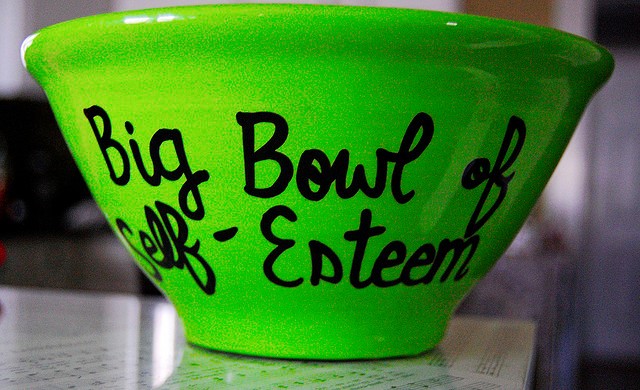
After reading up on the need to apologise, I found that many anxiety sufferers say sorry so they can be reassured by others. This made complete sense. Why had I never realised this before? When anxiety takes hold it can be extremely frightening and we just want someone to say it will be ok. At the risk of sounding ironic, it has been reassuring to find that many other sufferers of anxiety disorders have a need for reassurance. Only recently I saw a new post by another anxiety sufferer who seems to like to prove Elton wrong – sorry comes just as easily to her as it does to me.
Constantly seeking reassurance, though, can be just as damaging as not seeking it at all. If we always need someone else to tell us everything is fine we will never learn how to console ourselves. When I am sat on a train going in to work I have no one to reassure me that my panic attack will not harm me and that it will soon be over. I have to do this myself, and the more I learn to do this – even when other people are around – the better I will be able to cope in such situations when I am on my own.
There is also the risk that although reassurance may make you feel better at the time you will need to keep seeking more and more to feel at ease. One writer even goes as far as saying “reassurance is addictive. If reassurance were a substance, it would be considered right up there with crack cocaine.” Seeking reassurance also gives validity to the issue you are seeking reassurance for and actually reinforces anxiety rather than diminishing it. It is as if asking someone to reassure you about something makes the imaginary issue real. Crying in front of my friends was not an issue, ‘that’s what friends are there for’, but needing to apologise for it made it into an issue for me. My friends probably didn’t give it a second thought but by apologising to them I brought it back into focus again – something I did not need to do. Another example of anxiety feeding on anxiety.
How others see you
I always used to believe that apologising shows how nice and accommodating I am – but after reading up about it I have found that it, more often than not, gives the impression that I am weak and don’t stand up for what I believe in. Recently I’ve started to wonder whether my need to apologise could have affected my job prospects. I know that one interviewer, who I later did some voluntary work for, said I lacked confidence in my interview. A study undertaken earlier this year found that confidence was the biggest issue in interviews. I am not alone, though, as a woman who feels the need to apologise in professional settings. A recent article in the New York Times has drawn attention to the fact women apologise to a much greater extent than men, especially in the work place. Although, presumably, not all these women will suffer from anxiety issues, it is apparent that their need to say sorry so frequently displays their lack of self-esteem.
I’m sure others in my position have realised, like me, that constantly apologising to people when there is no need can become very irritating. I bet you’ve all said ‘sorry’ when your partner, family or friend has told you to stop apologising. Don’t apologise for over-apologising, just stop bloody apologising!! Easier said than done. If you want to build your self-esteem, though, and come across as a self-assured individual you need to break the habit. So before I start another sentence with ‘Sorry, but …’ I’m going to bite my tongue. Not only do I need to learn to limit my apologies, I need to stop explaining myself to everyone and learn the power of ‘no’, if I continue to try and please everyone else I will never please myself. (A mantra I must remember at Christmas!!)
